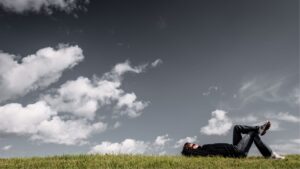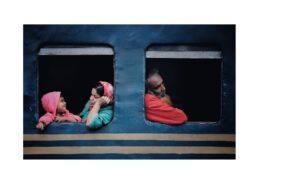40+ Important MCQs on ‘Travel by Train’ and ‘On Doing Nothing’ – J.B. Priestley
Before diving into the 40+ Important MCQs on ‘Travel by Train’ and ‘On Doing Nothing’ – J.B. Priestley, let’s have a brief introduction to both essays, “Travel by Train” and “On Doing Nothing” by J.B. Priestley, written in simple English with 40+ Important MCQs.
Introduction to “Travel by Train” by J.B. Priestley
“Travel by Train” is a humorous and reflective essay in which J.B. Priestley expresses his deep fondness for traveling by train. He compares it with other modes of travel, such as cars and airplanes, and explains why he finds trains more peaceful and enjoyable. The essay highlights the charm of slow travel, the beauty of observing the countryside, and the different types of people one meets during a train journey. Through his light and witty tone, Priestley not only entertains the reader but also encourages them to enjoy the simple pleasures of life.
Introduction to “On Doing Nothing” by J.B. Priestley
In “On Doing Nothing,” J.B. Priestley talks about the importance of rest in our busy lives. He criticizes the modern world’s obsession with being constantly active and productive. Priestley argues that doing nothing—like sitting quietly, daydreaming, or just watching the world go by—is not a waste of time, but rather a necessary break for our minds and souls. With his usual humour and insight, he defends the idea that sometimes, the best thing we can do is pause and think.
These multiple-choice questions (MCQs) test your understanding of the essay’s content, structure, themes, and philosophical ideas. They will help you reinforce key points from the essay and prepare effectively for exams or discussions. The answers are marked in RED. I hope these questions help you understand both the essays more deeply.
Q. 1. In “Travel By Train,” what is the author’s primary mode of transportation?
A) Car B) Bicycle C) Train D) Airplane
Q. 2. What is the central theme of “Travel By Train”?
A) The beauty of nature B) The thrill of adventure
C) The monotony of routine D) The joys of train travel
 Q.3. According to “On Doing Nothing,” what is the author’s view on idleness?
Q.3. According to “On Doing Nothing,” what is the author’s view on idleness?
A) It is a waste of time B) It is essential for creativity
C) It leads to boredom D) It is frowned upon by society
Q.4. Which of the following words best describes the tone of “Travel By Train”?
A) Energetic B) Reflective C) Suspenseful D) Melancholic
Q. 5. How does the author feel about the act of doing nothing in “On Doing Nothing”?
A) It is detrimental to personal growth B) It is a luxury to be enjoyed
C) It is a sign of laziness D) It is reserved for the privileged
Q.6. What does the author suggest about the train travel experience in “Travel By Train”?
A) It is predictable and boring B) It is exhilarating and unpredictable
C) It is overcrowded and uncomfortable D) It is expensive and time-consuming
Q. 7. According to “On Doing Nothing,” what is the benefit of taking time to do nothing?
A) Increased productivity B) Improves mental health
C) Financial success D) Social recognition
 Q. 8. What aspect of train travel does the author find fascinating in “Travel By Train”?
Q. 8. What aspect of train travel does the author find fascinating in “Travel By Train”?
A) The speed B) The scenery
C) The passengers D) The noise
Q. 9. How does the author contrast doing nothing with other activities in “On Doing Nothing”?
A) It is less fulfilling than work B) It is more enjoyable than leisure activities
C) It is a waste of time compared to productive pursuits. D) It is equally valuable as other forms of relaxation
Q. 10. What does the author suggest about the pace of life in “On Doing Nothing”?
A) It is too slow. B) It is too fast. C) It is just right. D) It varies depending on the individual
Q. 11. What emotions does the author associate with train travel in “Travel By Train”?
A) Anxiety and fear B) Excitement and wonder
C) Boredom and frustration D) Nostalgia and longing
Q. 12. According to “On Doing Nothing,” what is the danger of constantly being busy?
A) Burnout B) Boredom C) Laziness D) Isolation
Q. 13. How does the author describe the scenery observed during train travel in “Travel By Train”?
A) Dull and uninteresting B) Vibrant and captivating
C) Chaotic and overwhelming D) Monotonous and repetitive
Q. 14. What does the author imply about the value of leisure time in “On Doing Nothing”?
A) It should be minimized B) It should be cherished
C) It should be avoided D) It should be monetized
Q. 15. What does the author suggest about the significance of small moments in “Travel By Train”?
A) They are easily forgotten B) They are fleeting but meaningful
C) They are insignificant in the grand scheme of things D) They are the source of regret
Q. 16. How does the author view the concept of busyness in “On Doing Nothing”?
A) As a virtue to be praised B) As a societal expectation
C) As a hindrance to personal growth D) As a sign of intelligence
Q. 17. What is the author’s attitude toward routine in “Travel By Train”?
A) Disdainful B) Accepting C) Enthusiastic D) Resentful
Q. 18. According to “On Doing Nothing,” what is the relationship between idleness and creativity?
A) They are incompatible B) They are mutually beneficial
C) They are unrelated D) They are opposites
Q. 19. How does the author perceive the passing of time during train travel in “Travel By Train”?
A) It feels slow and endless B) It feels fast and fleeting
C) It feels monotonous and repetitive D) It feels suspenseful and exciting
Q. 20. What does the author suggest about the importance of relaxation in “On Doing Nothing”?
A) It is necessary for physical health B) It is a luxury for the wealthy
C) It is a waste of time D) It is essential for mental well-being
Q. 21. What was the occupation of J.B. Priestley’s father?
A) Doctor B) Lawyer C) Teacher D) Cloth merchant
Q. 22. Where was J.B. Priestley born?
A) London, England B) Manchester, England C) Bradford, England D) Edinburgh, Scotland
Q. 23. Which university did J.B. Priestley attend?
A) Oxford University B) Cambridge University
C) London School of Economics D) University of Leeds
Q. 24. What subject did J.B. Priestley study at university?
A) Literature B) History C) Philosophy D) Chemistry
Q. 25. What prestigious literary award did J.B. Priestley receive in 1940?
A) Nobel Prize in Literature B) Pulitzer Prize
C) Man Booker Prize D) James Tait Black Memorial Prize
Q. 26. Who was J.B. Priestley’s mother?
A) Emily Priestley B) Mary Priestley
C) Emma Priestley D) Clara Priestley
Q. 27. In which year was J.B. Priestley knighted?
A) 1945 B) 1953 C) 1960 D) 1973
Q. 28. Which of the following plays by J.B. Priestley is considered a classic of 20th-century English theatre?
A) “An Inspector Calls” B) “The Importance of Being Earnest”
C) “Waiting for Godot” D) “A Streetcar Named Desire”
Q. 29. What was the name of J.B. Priestley’s first wife?
A) Jane Wyndham Lewis B) Penelope Wilton C) Jane Hawkes D) Patience Finch
Q. 30. Which literary society did J.B. Priestley co-found in 1931?
A) Royal Society of Literature B) The Bloomsbury Group
C) The Detection Club D) The Left Book Club
Q. 31. What was the title of J.B. Priestley’s first published novel?
A) “The Good Companions” B) “Angel Pavement” C) “Bright Day” D) “The Thirty-First of June”
Answer: A) “The Good Companions”
Q. 32. Which war profoundly influenced J.B. Priestley’s writing and political views?
A) World War I B) Spanish Civil War C) World War II D) Korean War
Q. 33. Where did J.B. Priestley serve during World War I?
A) British Army B) Royal Navy C) Royal Air Force D) He was a conscientious objector
Q. 34. What was the title of J.B. Priestley’s autobiographical work published in 1962?
A) “Margin Released” B) “Lost Empires”
C) “Rain Upon Godshill” D) “English Journey”
Q. 35. Which of J.B. Priestley’s plays features the concept of time travel?
A) “Dangerous Corner” B) “I Have Been Here Before”
C) “The Linden Tree” D) “Time and the Conways”
Q. 36. What was the title of J.B. Priestley’s last published work before he died in 1984?
A) “The Image Men” B) “Out of the People”
C) “Apes and Angels” D) “Thoughts in the Wilderness”
Q. 37. Which literary award did J.B. Priestley receive in 1977 for his contribution to literature?
A) Booker Prize B) Pulitzer Prize
C) James Tait Black Memorial Prize D) Order of Merit
Q. 38. In which year did J.B. Priestley publish his famous essay “An Inspector Calls”?
A) 1942 B) 1945 C) 1947 D) 1950
Q. 39. Which of J.B. Priestley’s works is often cited as an example of his socialist views?
A) “The Good Companions” B) “An Inspector Calls”
C) “Angel Pavement” D) “Time and the Conways”
Q. 40. Which honor did J.B. Priestley decline in 1969, citing his objection to the British Empire’s policies?
A) Knighthood B) Nobel Prize in Literature
C) Commander of the Order of the British Empire (CBE) D) Companion of Honour
